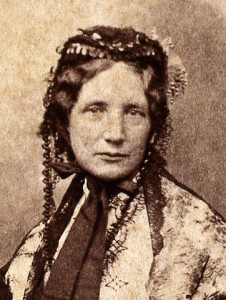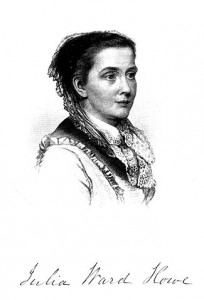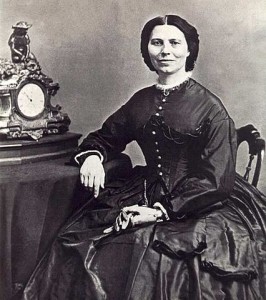From The Archives: Tough Broads of the Civil War
Just to prove that I’ve been thinking about nurses and other women who played a role in the American Civil War for a while now, here’s a post that first appeared in the Margins in 2011:
- Harriet Beecher Stowe
- Julia Ward Howe
- Clara Barton
I’ve said it before: If you hang out in Popular History Land, or even Book World these days, it’s impossible to ignore the American Civil War and its sesquicentennial. Civil War references are everywhere.
The most recent bit of Civil War “stuff” to start my brain churning was a review of a new book by historian David S. Reynolds: Mightier Than the Sword: Uncle Tom’s Cabin and the Battle for America. Reynolds’ book looks fascinating. I’ve added it to my ever-growing To-Be-Read list. But I’m not sure it will have as much impact on me as the first book I ever read on Harriet Beecher Stowe.
When I was in the fifth or sixth grade, our school library got a handful of biographies on American women in history. I’m not sure now if they were a series or separate biographies pulled together by a school librarian with a bee in her bonnet. Either way, I loved the books and read them as often as I was allowed before they circulated on to another school. Although each woman’s story was different, they held a common theme: a smart tomboy (or at least a not-very-girly girl) has trouble as a child but grows up to do Something Important. They were balm to my nerdy, not-very-girly soul. They also left me with the abiding impression that the Civil War was a period when women were kicking down doors and doing things they’d never done before.
Turns out that impression was right. Look at the roster:
- Harriet Beecher Stowe’s Uncle Tom’s Cabin inflamed the North on the subject of slavery. To quote Abraham Lincoln (via Carl Sandburg), “So you’re the little woman who wrote the book that made this great war!”
- Julia Ward Howe provided the North with a soundtrack for the war: a little ditty called The Battle Hymn of the Republic.
- Clara Barton, “the soldier’s friend”, charmed and kicked men in high places until they allowed her to provide comforts and medical care to “her boys” on the battlefield. When the need for her services in the field diminished, she helped the families of missing soldiers locate their fathers, sons, and brothers. After the war, she started a little group called the American Red Cross. Maybe you’ve heard of it?
- Hundreds of women in both the North and South took the unheard of step of volunteering in military hospitals. (If you want a lively first hand account of one young woman’s Civil War nursing experience, check out Louisa May Alcott’s Hospital Sketches.)
- Most amazing of all, women cut their hair, disguised themselves as men, and enlisted to fight.* Some followed their husbands or fiancés. Others enlisted out of a sense of patriotism or adventure. For obvious reasons, we don’t know how many women fought disguised as men, but an article in the National Archives estimates 250 women fought for the Confederacy and almost 400 for the Union. Most were not discovered until they were wounded or died. At least one woman, discovered and discharged for the official reason of “incompatibility of sex” (The fact that there was an official term of discharge tells you everything you need to know.), suited up and joined a new regiment.
Tough broads indeed.
Who’s your favorite tough broad of the Civil War?
*If you want to read a take on this general topic that’s hysterical rather than historical, check out Monstrous Regiment by one of my favorite novelists, Terry Pratchett. It will make you both laugh and think. I promise.


